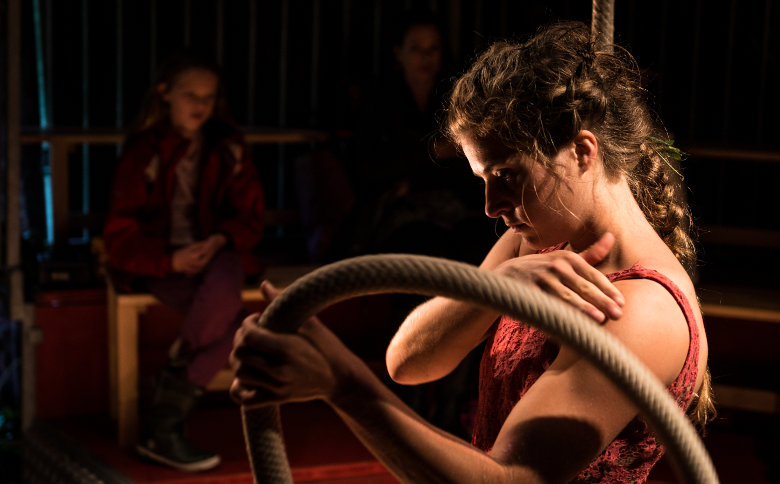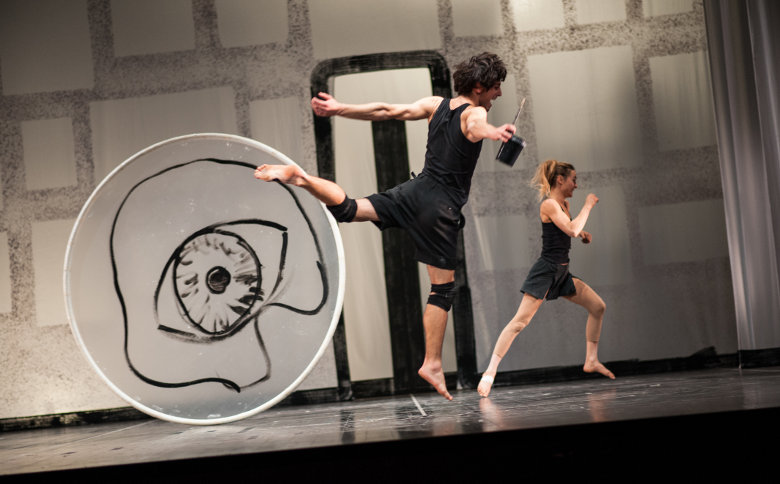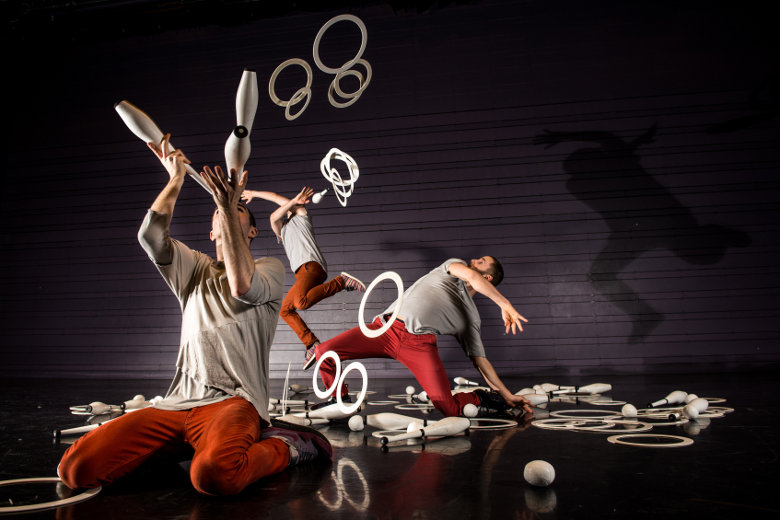
There's not so much to say about February. Subcase is happening in Stockholm – see you there, if you're going – and Circa are at the Barbican again with new piece Opus.
Otherwise it's a quiet month, so I'll recommend something else... In early January Culturebox, FranceTV's robust online arts channel, streamed a performance of Robert Wilson's Einstein on the Beach at Théâtre du Châtelet, available as a VOD here. It's four and a half hours, but I don't think you have to sit there rapt the whole time. Personally I cleaned my kitchen during the boring bits & tabbed out to write e-mails from time to time. I liked it though, and it's pretty interesting to think about a culture that supports demanding art on this scale and at this expense. Anyway, it's online for a couple more months I think, not forever.
Anyway, on to this month's deconstructions...
Deconstructing Circus
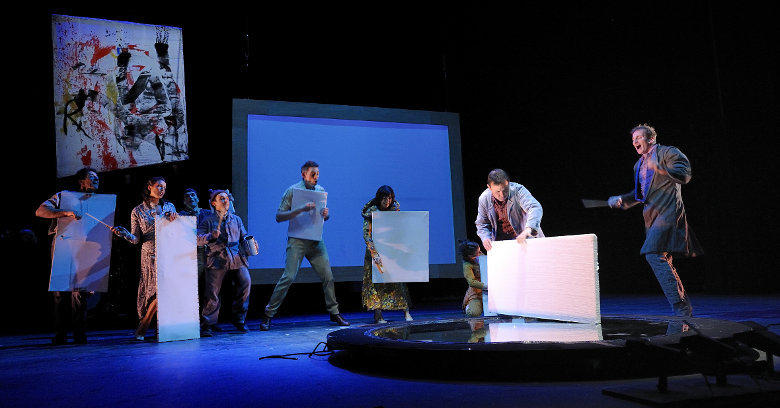
Bernard Kudlak on L’Atelier du Peintre
'They are images that line after line – that is to say, moment after moment – resonate. Like a bell that resonates a note which resonates another note which resonates another.'
This one's by contributor #3, Māra Pāvula, who I met last year at a new festival in Latvia called Re Re Riga. She was doing some on the ground work for the festival, but also wrote some texts for their website that I thought had a nice slant/personality, even in translation. At the time I was looking for someone who could contribute to the d/c project as a sort of emissary to France, and when Māra told me she was studying in Paris, and spoke the Francais, it seemed right to respect this note of good fortune.
So here is her interview with Bernard Kudlak, one of the founders and the current artistic director of the seminal new circus company Cirque Plume. My professional analysis of the interview is that Bernard is very French and talks about his work like a French artist. His enthusiasm is likeable, I think. The brutal necessities of editing cut a few charming quotes, including a nice, perhaps also delicious, mille-feuille analogy & then this Norse one: 'There is a character from Scandinavian mythology that I am fascinated with and I think about him for circus. It is Loki. He was a troubled character who had to capture Odin’s dogs, and he created a leash by weaving the four winds. And the idea to weave the four winds, for me that is circus.'
'I knew that I wanted to make a performance for children that would ask the child's essential aesthetic question: Why?'
I'm trying to think when I first met Sverre. At a festival, I suppose, but after a shy start he's become of the international circus types I most like to talk to and be around. He's generous with time and attention & full of thoughts and stories about art, painters, poetry, literature – an epic all-nighter with a depressive alcoholic playwright, the arts world in Montreal at the end of the last century, old projects and collaborations with dancers, visual artists, musicians.
But my quintessential Sverre memory is from Auch in 2012. Johann Le Guillerm was there with Secret. Sverre had wanted to bring him to the Circus Village for many years, and had admired his work, rapturously, for more years than that. He came to me and said that he wanted to talk with Johann Le Guillerm and that he was thinking I could do an interview with Johann at the same time.
Later at the CIRCa canteen, Sverre is nervous. The folding trestle tables are in ranks and Le Guillerm is two rows down from us. 'He's sitting over there! I should do it now. I should just ask him.' For perhaps the fourth time Sverre asks me if I want to interview Le Guillerm, I confirm that I would, and he makes the walk. A couple minutes later he comes back a little triumphant, a little wild eyed, like he's just asked Johann on a date. 'He said yes!'
The interview is to take place on the restaurant bus that's parked-up at Auch for the week. Sverre shows up an hour early to hold a table, just in case, and we rope in Bauke Lievens to be our translator. When Johann arrives there are two Cirque Ici company members with him, so there's actually six of us in there, crammed into two booths at the back of the upper deck.
In the whole of the ensuing hour I think I say hardly anything. Sverre has questions about architecture, notions of the tragic, mutation, Le Guillerm's older practice of walking on bottles and why he dropped that, the idea of digging at the single point to find everything, research and alchemy and the devil, Aristotle and the classical elements. He wants to know it all, all of it. When time is up and Johann leaves Sverre is buoyant but also distraught. 'I didn't ask him anything about his childhood! I had so many more questions...'
Anyway, what I'm getting at: Sverre has an enthusiasm for what he does that's wide and embracing, and a curiosity that seems to never dim. Hopefully some of that comes across in the interview; hopefully you can feel a little bit of it and take it away with you.
If Sverre were sitting next to you as you watched the video – which incidentally is exactly what I want to happen in your imagination – he'd probably disclaim that this is the only time a little girl has wandered dreamily around on stage & would perhaps express dark thoughts re the parents and their sense of responsibility / appropriate behaviour. Personally I'm sort of into it. I picked the scene because I like the way lifting the stone is a circus skill for the kids – just as amazing as climbing a rope and going upside down – and getting up for a closer look is only a little part of that, and, probably, what six year-old Sverre would have liked to do as well.
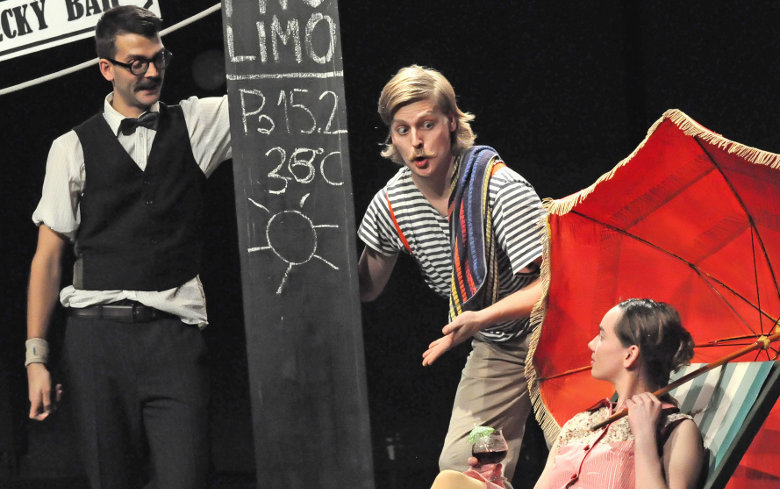
Veronika Riedlbauchová on Riverside
'I wished to be inspired by the atmosphere of Poetism, an artistic movement founded in Czechoslovakia in the 1920s which placed a great deal of emphasis on playfulness, optimism and a zeal for life.'
Interview no. 2 by Veronika Štefanová is with the Czech director Veronika Riedlbauchová – an unknown to me, but apparently a rising star over there. And also perhaps over here: Veronika R. was announced last month as one of the fifteen artists/companies shortlisted for CircusNext 2013-14. Look out for her, and her project WaYting, in the future!
''From the very beginning I aimed at the fun part of visual arts, their life, didn’t want to show them as something dead and in the past as we too often learn at school. No! visual arts are emotion and also can be a game — a physical game.'
This piece, the second by Cesc Martinez, went up at the end of last year so perhaps by now you've read it, absorbed it, internalised its wisdoms. I like it very much – both the scene itself and the interview with Xavier and the company. It's fresh.
(As a second CircusNext connection btw the acrobat in the video, Jonathan Frau, is a member of Oktobre, laureates from last year who just a few days ago premiered their new piece in Auch. They'll be doing some festivals this summer.)
